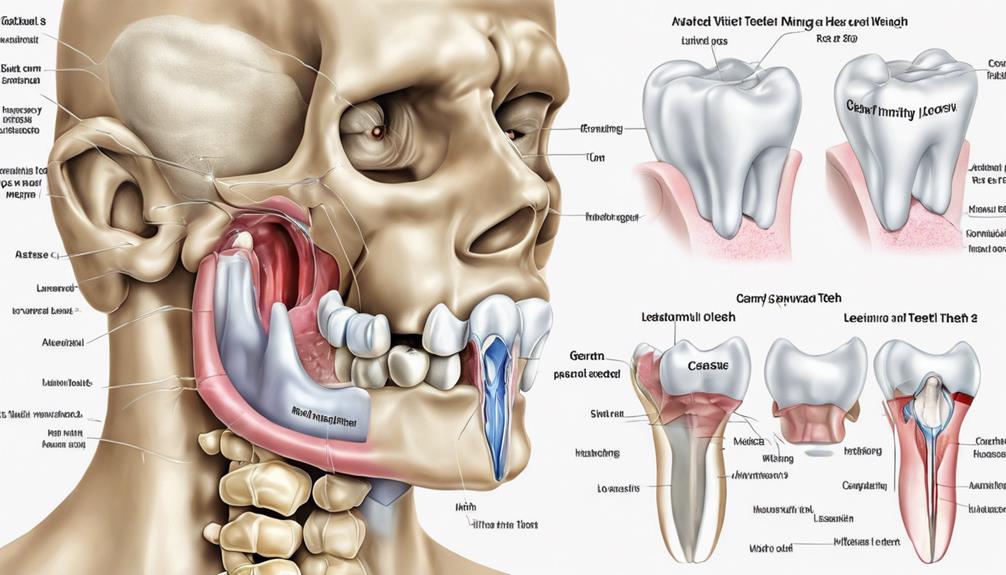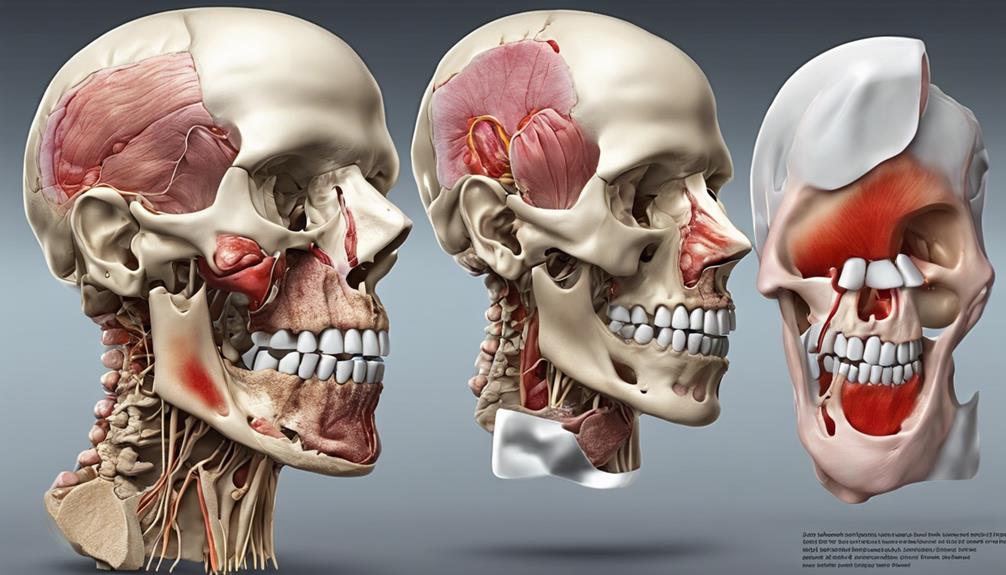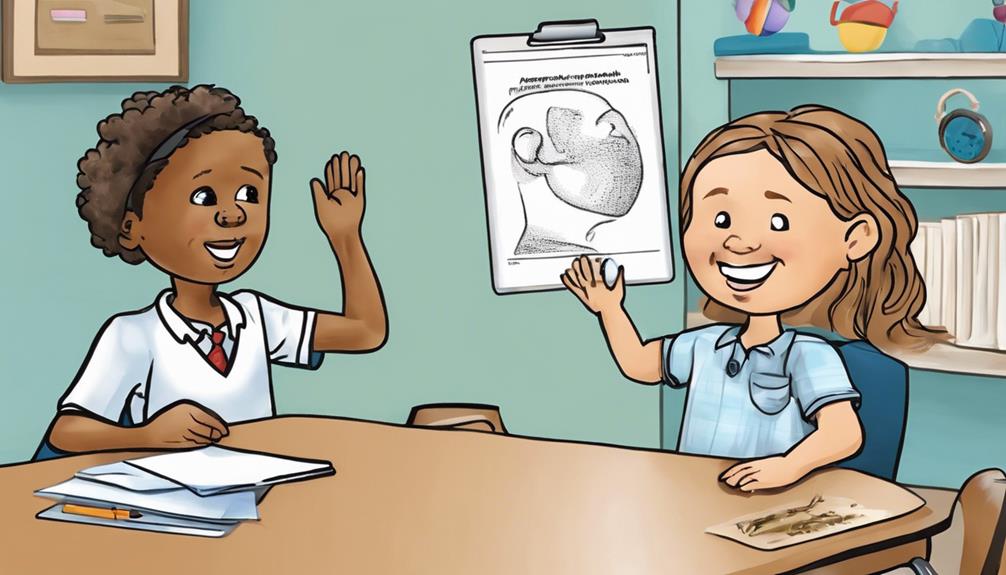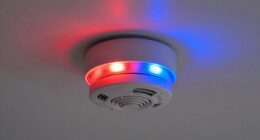Let’s unravel how a straightforward tooth infection might secretly be causing unforeseen hearing problems.
The intricate relationship between oral health and our sense of hearing unveils a fascinating connection that might surprise you.
As we navigate through the complexities of this topic, we'll uncover the subtle yet impactful ways in which dental health can influence our auditory world.
Stay tuned to unravel the mystery behind how something as small as a tooth could have a significant impact on our ability to hear clearly.
Key Takeaways
- Dental infections can lead to hearing loss by disrupting inner ear blood flow.
- Wisdom teeth infections may affect auditory function, necessitating timely extraction.
- TMJ disorder can cause temporary hearing impairment due to nerve pathway inflammation.
- Maintaining good oral health is crucial in preserving proper blood flow for optimal hearing.
The Dental Microbiome and Hearing Loss
When bacteria from the dental microbiome cause infections, they can potentially lead to hearing loss by impacting blood flow to the inner ear. The connection between dental health and hearing is intricate, with tooth infections playing a significant role.
Infections in the teeth can escalate to the point where bacteria spread into the bloodstream, triggering a cascade of events that can affect the delicate cells in the ear responsible for hearing. Specifically, these bacteria can cause inflammation in blood vessels, disrupting the normal flow of blood to the inner ear.
This alteration in blood circulation can have detrimental effects on the cells in the ear, potentially contributing to hearing loss over time. Therefore, maintaining good oral hygiene practices is crucial not only for the health of our teeth and gums but also to prevent the development of dental issues that could ultimately impact our hearing abilities.
Impact of Wisdom Teeth on Hearing

The impact of wisdom teeth on hearing can be significant, especially when considering their potential to lead to infections and inflammation that may affect auditory function. Impacted wisdom teeth, a common dental issue, can result in inflammation that extends beyond the dental region to affect the inner ear and auditory nerve. This inflammation can trigger symptoms such as ear pain, ringing sensations, or even hearing loss. When infected wisdom teeth are left untreated, the inflammation can worsen, potentially causing further complications for hearing.
To assess the impact of wisdom teeth on hearing, dental professionals often utilize X-rays to diagnose the presence of impacted wisdom teeth and evaluate any associated risks to auditory function. Prompt extraction of infected or impacted wisdom teeth is crucial in preventing the progression of inflammation that could lead to lasting hearing impairment. Seeking timely dental attention for impacted wisdom teeth is essential in maintaining not only dental health but also preserving optimal hearing capabilities.
TMJ Disorder and Hearing Impairment
Experiencing TMJ disorder can potentially result in temporary hearing impairment caused by inflammation affecting the inner ear nerve pathway. When the temporomandibular joint is dysfunctional, it can lead to issues that impact hearing. Here are three key points to consider:
- Inflammation in the TMJ area can affect the nerve pathway responsible for transmitting auditory signals to the brain, leading to temporary hearing impairment.
- Individuals with TMJ disorder may experience symptoms such as ear pain, ringing in the ears (tinnitus), or difficulty hearing sounds clearly.
- Seeking timely treatment for TMJ-related symptoms is essential to address any potential hearing problems effectively and prevent long-term complications.
Understanding the connection between TMJ disorder and hearing impairment is crucial in managing these conditions. By recognizing the signs and seeking professional help, individuals can take proactive steps towards improving both their oral health and hearing abilities.
Link Between Dental Infections and Hearing

Understanding the impact of dental infections on hearing health is crucial for preventing potential complications and maintaining overall well-being. When dental infections occur, harmful bacteria can enter the bloodstream and affect various parts of the body, including the delicate structures responsible for hearing. Inflammation plays a significant role in this process, as it can disrupt blood flow to essential areas like the inner ear, leading to hearing loss. The intricate connection between dental health and hearing underscores the importance of addressing dental issues promptly to safeguard auditory function. To highlight the intricate relationship between dental infections and hearing, let's examine the key components affected in the table below:
| Components | Role | Impact on Hearing |
|---|---|---|
| Blood Vessels | Provide nutrients and oxygen to tissues | Disrupted flow can affect hearing |
| Cells | Building blocks of tissues | Damage can impair hearing |
| Wisdom Teeth | Back molars that can harbor infections | Infections can lead to hearing issues |
| Hair Cells | Convert sound vibrations into signals | Damage can result in hearing loss |
Preventing Hearing Loss Through Dental Care
Regular dental check-ups and proper oral hygiene practices can significantly contribute to preventing hearing loss by addressing oral health issues early on. Maintaining good oral health is crucial in preserving overall well-being, including hearing clarity. Here are some key ways dental care can help prevent hearing loss:
- Regular Dental Check-ups: Routine visits to the dentist can help catch any potential oral health issues, such as gum disease or impacted wisdom teeth, before they escalate and potentially affect hearing.
- Proper Oral Hygiene: Brushing and flossing daily can reduce harmful bacteria in the mouth that could travel to the ears and impact hearing abilities.
- Healthy Blood Flow: Inflammation from tooth infections can disrupt blood flow to the ear, leading to hearing problems. By addressing dental issues promptly, you can help maintain proper blood circulation and preserve your hearing.
Frequently Asked Questions
Can You Lose Your Hearing From a Tooth Infection?
Yes, tooth infections can potentially lead to hearing loss. Inflammation caused by a tooth infection can affect blood flow to the inner ear, disrupting its functions and impacting our ability to hear.
Bacteria from the infection can spread to the inner ear, further complicating the issue. Seeking timely dental treatment for a tooth infection is crucial in preventing potential hearing loss.
What Are the Symptoms of a Tooth Infection Spreading to the Body?
When a tooth infection spreads to the body, symptoms may include:
- Fever
- Chills
- Swelling in the face, neck, or jaw
- Fatigue
- Increased heart rate
- Elevated white blood cell count
- Body aches
- Swollen lymph nodes
These signs indicate a severe infection affecting the whole system. It's crucial to seek immediate dental and medical attention if you experience any of these symptoms to prevent further complications.
What Happens if Tooth Infection Spreads to Ear?
When a tooth infection spreads to the ear, it can lead to symptoms like dizziness, vertigo, tinnitus, and hearing loss. Bacteria from the infected tooth can travel through the bloodstream to the inner ear, affecting its balance and hearing functions.
The connection between a tooth infection and the ear can result in complications like inner ear inflammation and nerve disturbances. Prompt dental treatment is crucial to prevent further complications and effectively address dental and auditory problems.
Can a Root Canal Affect Your Hearing?
Yes, a root canal can affect your hearing if left untreated. Infections from the tooth can spread inflammation to nearby nerves and blood vessels, potentially impacting the inner ear.
Seeking prompt treatment for a root canal infection is crucial to prevent complications that may harm your hearing. It's important to consult a dentist if you suspect a tooth infection to address any risks to your hearing health.
Conclusion
In conclusion, taking care of our pearly whites can also protect our precious hearing. Remember, a little love for our teeth means a lot for our ears. So, let's keep up with those dental check-ups and say goodbye to potential hearing troubles.
It's all about keeping our oral health in check for a harmonious and joyful life.










